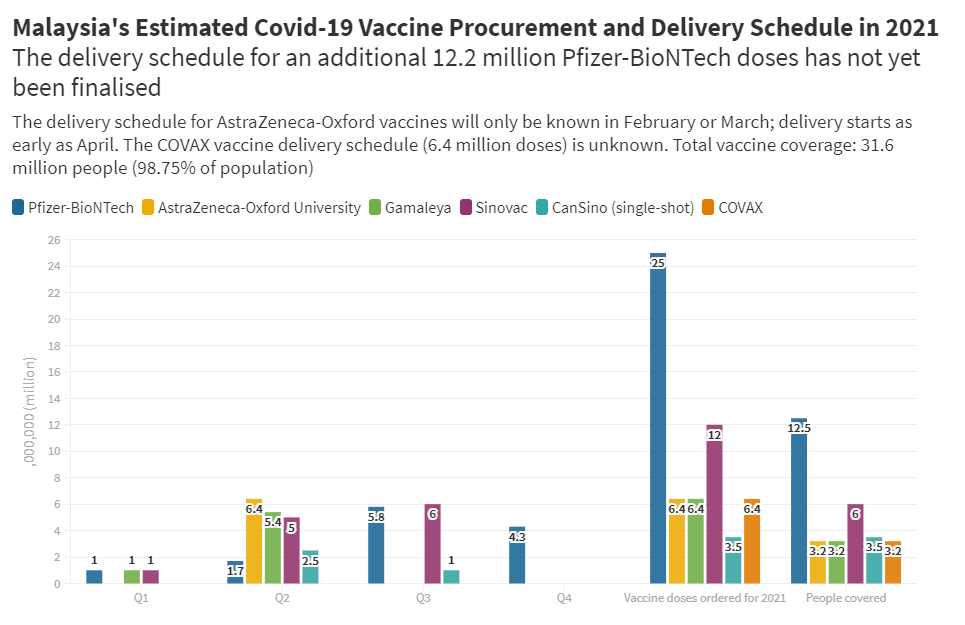KUALA LUMPUR, Jan 29 — The first million doses of Pfizer’s Covid-19 vaccine will be delivered to Malaysia in batches across six weeks, with an initial shipment of 144,000 shots arriving next month.
A batch of 144,000 Pfizer-BioNTech shots is expected to be delivered to Malaysia each week for five weeks, and 280,000 doses delivered in the sixth week.
Science, Technology and Innovation Minister Khairy Jamaluddin said the national Covid-19 vaccination programme will also start in February, targeting 150,000 shots administered daily nationwide by the middle of the year.
The staggered delivery of Pfizer doses is due to the US pharmaceutical company’s manufacturing capacity, according to the minister.
“It allows us to start the immunisation campaign gradually,” Khairy told CodeBlue in an exclusive interview Monday.
“We don’t mind receiving one million one shot, but it makes things easy because we can direct them — 10,000 here, 10,000 there.”
Khairy added that the government is still negotiating with Johnson & Johnson for its single-dose Covid-19 vaccine, as well as with Moderna. However, the Moderna shot — which has been approved by US, UK, and European regulators — is “quite expensive”.
“If we buy the Moderna one, we’ll be above the budget. But I’m considering it because, I wouldn’t say proven, it’s got regulatory approval in the UK and the US. The issue that we have with Chinese vaccines, we got a good deal, but we’re held up with the regulatory process,” said Khairy.
Khairy said that upon delivery to Malaysia, the Pfizer vaccines, which require a storage temperature of minus 70 degrees Celsius, will be transported immediately to the 55 nationwide storage sites with ultra-low temperature freezers.
Malaysia is scheduled to receive three million vaccine doses by quarter one (Pfizer: 1 million, Gamaleya: 1 million, Sinovac: 1 million). Quarter two will see delivery of 21 million doses (Pfizer: 1.7 million, AstraZeneca: 6.4 million, Gamaleya: 5.4 million, Sinovac: 5 million, CanSino: 2.5 million).
The delivery schedule for AstraZeneca’s vaccine procured directly by the Malaysian government, however, will only be known in February or March; delivery is expected to start as early as April.
Quarter three of this year will see delivery of 12.8 million doses (Pfizer: 5.8 million, Sinovac: 6 million, CanSino: 1 million). Malaysia expects to receive 4.3 million doses in quarter four, all from Pfizer.
Hence, Malaysia has confirmed delivery of 41.1 million vaccine doses throughout this year. The government is also trying to finalise the delivery schedule of an additional 12.2 million Pfizer shots, aside from the 12.8 million doses promised to Malaysia this year.
“We’re trying to get everything delivered this year. Only Pfizer, I’ve not finalised the additional order because they’ve not committed to delivering it this year,” Khairy said, adding that the Malaysian government can only purchase a maximum of 25 million doses from Pfizer.
The 41.1 million vaccine doses confirmed for delivery to Malaysia this year excludes the 6.4 million doses purchased from the global COVAX plan, with Khairy saying: “We don’t know the COVAX delivery schedule yet”.
The COVAX Facility announced last January 22 that it anticipated starting delivery of Covid-19 vaccines by the end of February. The EU has threatened to restrict exports of Covid-19 vaccines produced in the bloc, amid reduced supplies from AstraZeneca and Pfizer-BioNTech due to production problems, BBC reported. AstraZeneca’s vaccine is mainly produced in the UK; Malaysia will receive supply of the Pfizer-BioNTech shot from the company’s plant in Belgium.
The 41.1 million Covid-19 vaccine doses from Pfizer, Sinovac, AstraZeneca, Russia’s Gamaleya Institute, and CanSino (single-dose regimen) that Malaysia has scheduled to receive this year covers 22.3 million people.
Combined with the additional 12.2 million Pfizer doses for 6.1 million people, and 6.4 million doses from COVAX for 3.2 million people, Malaysia’s total coronavirus vaccine supply to date will cover 31.6 million people, or 98.75 per cent of the 32-million population. The government aims to inoculate 27 million adults, or more than 80 per cent of the population, earliest by this December.
“We may add a bit more to get to 100 per cent to mitigate against manufacturing risk and regulatory risk. What we end up committing to with all the caveats of refundable deposits, we might be at about 100 per cent soon,” Khairy said.
When asked if it was wise for the Malaysian government to invest in the coronavirus vaccine by Chinese company Sinovac, in light of the vaccine’s 50.4 per cent efficacy shown in a late-stage trial in Brazil, Khairy said Malaysia has received more granular data about the studies. Malaysia’s Institute for Clinical Research (ICR) is currently examining data from the Sinovac trials.
“We’ve not given up on Sinovac, we’re still evaluating,” said Khairy. “I’ve built into the negotiations things like refundable deposits which secure our financial position. So we can go ahead with it. If it doesn’t work out, we can walk away from it. There won’t be a financial implication to the Malaysian government. But it’s important that we secure the supply first.”
The Ministry of Health (MOH) signed Tuesday agreements with Pharmaniaga Life Science Sdn Bhd and Duopharma Sdn Bhd to supply 12 million Sinovac doses and 6.4 million Sputnik V shots by the Gamaleya Institute respectively.
Correction note at 3.20pm: The fifth paragraph from the bottom clarifies total vaccine coverage for Malaysia, which is 98.75 per cent population coverage, including COVAX supplies. The graphic has also been amended.
Read other stories from our interview with Khairy here:
- Malaysia Targets 75,000 Daily Jabs In Initial Covid-19 Vaccine Rollout
- Malaysia To Use Ring Vaccination For Covid-19 Outbreaks
- Government Personally Inviting Patients, Elderly For Covid-19 Vaccination
- Sarawak’s ‘Last Frontier’ To Dry Run Pfizer Vaccine
- Protect Yourself, Protect Everyone With Covid-19 Vaccines








